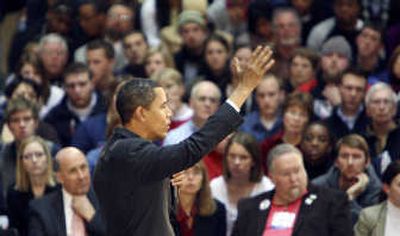Obama fleshes out proposals for the economy

JANESVILLE, Wis. – Sen. Barack Obama offered a detailed prescription for the ailing U.S. economy Wednesday, answering skeptics who contend he has not matched his inspirational talk with a mastery of policy and targeting voters in in Wisconsin, Ohio and Texas.
In the aftermath of sweeping victories Tuesday in Virginia, Maryland and Washington, D.C., Obama has 1,275 delegates to 1,220 for Sen. Hillary Rodham Clinton, of New York, according to the Associated Press. Obama campaign manager David Plouffe said the Illinois senator’s lead is “all but insurmountable,” and that Clinton could not catch up without help from so-called superdelegates, who are not elected in primaries or caucuses.
Obama’s advisers and many Democratic strategists believe he can win the nomination without necessarily piling up more support from working-class voters and women. His speech Wednesday signaled a new focus on the economy as he faces off against Clinton in Ohio and Texas, which hold primaries March 4; Pennsylvania, which holds its primary April 22; and Wisconsin, which votes Tuesday.
Recent polls show Obama with a narrow lead over Clinton in Wisconsin. He opened offices earlier, began television advertising sooner and visited the state twice last year.
Clinton signaled her intention to fight Obama with a new ad criticizing him for refusing to debate here before next Tuesday’s primary. Clinton plans to campaign in Wisconsin after stops today and Thursday in Texas and Ohio. Arizona Sen. John McCain, the probable Republican nominee, had voiced a far more negative view of Obama’s rhetoric in his own victory speech after Tuesday’s primaries, suggesting a line of attack if the two meet in the general election. McCain said that stirring the country “with only rhetoric, rather than sound and proven ideas … is not a promise of hope. It’s a platitude.”
Campaigning in Waukesha, Obama struck back at McCain, recalling the Arizona senator’s admission that economics was not his strong suit. “After what he’s said, it shows,” Obama said. He added that McCain first declared that President Bush’s tax cuts were unwise, but now favors a move to make them permanent.
“Somewhere along the line,” Obama said, “he traded those principles for the nomination.”
Obama chose an SUV plant belonging to General Motors, which on Tuesday announced record losses, to lay out in a 38-minute speech several strands of a policy – much of it more detailed versions of familiar themes – that emphasizes the protection and promotion of working-class voters.
The series of proposals were on issues from tax reform and private savings to bankruptcy, trade and investment in the nation’s infrastructure. He said he could pay for “every single element of this economic agenda” – primarily by ending the Iraq war and increasing taxes on corporations and the wealthiest Americans.
The newest element of his proposal was the establishment of a National Infrastructure Reinvestment Bank, which would spend $60 billion over a decade to rebuild roads, bridges and waterways. Obama said the spending would generate 2 million jobs, many of them in a construction industry hard hit by the housing market downturn.
Some state and local governments have established separate infrastructure accounts that are not subject to balanced-budget rules as a way to finance long-range building projects. Lawmakers in Congress from both parties have flirted with the idea of a federal infrastructure account but have backed off for fear of being accused of budgetary gimmickry designed to mask an expansion of government – and of the federal budget deficit.
Obama took a page from Massachusetts Democratic Sen. John Kerry’s presidential campaign of 2004, promising to fund his spending by ending tax breaks that he says encourage companies to invest overseas.
Many economists and some business officials agree that companies are reaping tax benefits from overseas expansion. But virtually no one would say that taxes are a primary – or even a significant – factor in the movement of white-collar manufacturing jobs abroad in the past several years.